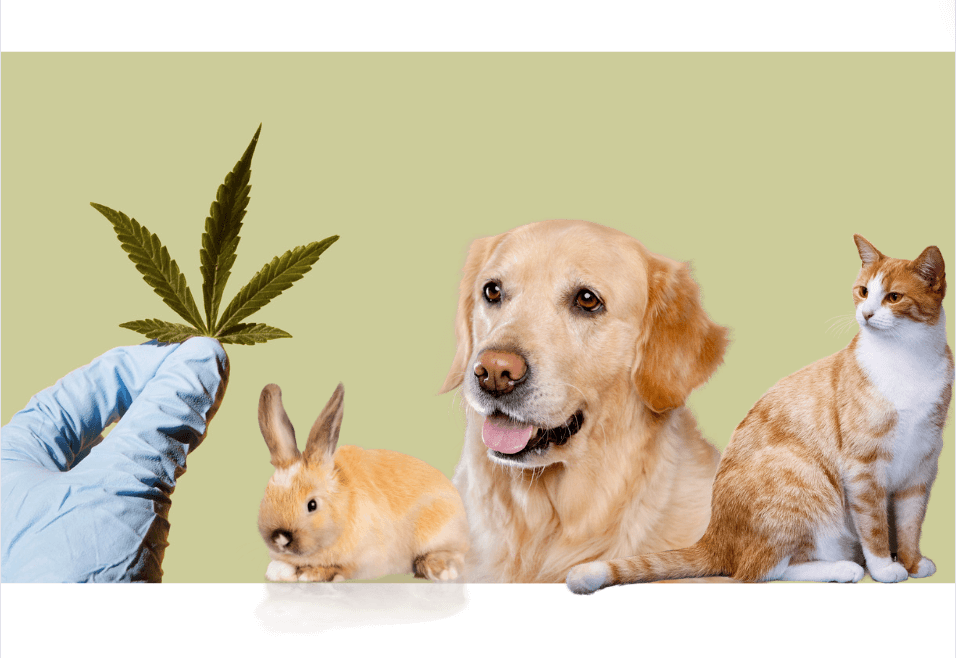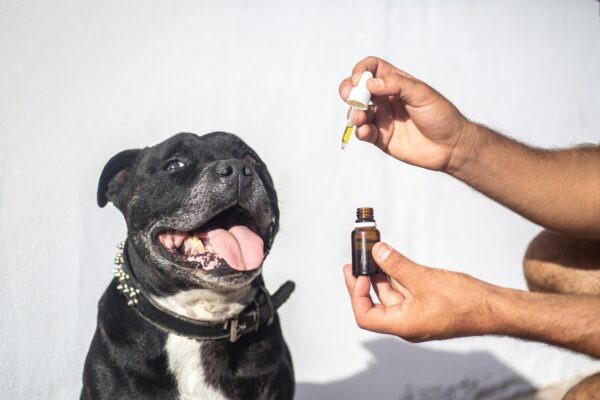Have a question? 06 70 73 89 02
🔞 Not for sale to under 18s
⏱️ 48-HOUR FLASH SALE: 20% off EVERYTHING on the site with the code FLASH 💥 ( excluding accessories and gummies)
Have a question? 06 70 73 89 02

Perhaps you've experienced the benefits of CBD yourself , and are wondering if it might help your 4-legged friend?
Cream, oil, treat, for dogs, cats, horses or rodents, we tell you everything there is to know about cbd and animals.
First of all, it's important to know that the CBD molecule influences the body's endocannabinoid system. This system is made up of a multitude of receptors scattered throughout the body. It is present in both humans and animals, be they mammals, reptiles, birds or fish.
When these receptors are activated, they generate chemical signals that influence a number of bodily functions such as stress, anxiety and pain management, as well as the physical response to inflammation, and even certain neurological functions.
As we said, all animals (apart from insects and crustaceans) have an endocannabinoid system. They are therefore sensitive to CBD, but also to the other cannabinoids present in hemp and cannabis.
Unsurprisingly, dogs are the animals in which the effects of CBD have been analyzed the most.
Some studies tend to show that CBD could help :
Combating pain and inflammation[1]: as in humans, studies have shown that CBD may have a beneficial effect on chronic pain, arthritis and similar inflammatory conditions.
Reducing epileptic seizures[2]: a study published in the Journal of the American Veterinary Medical Association (JAVMA) in 2019 found that CBD reduced the frequency of epileptic seizures in dogs receiving conventional anti-epileptic medication.
Calming anxiety[3]: A number of studies have found that taking CBD can help dogs deal with situations that are difficult and stressful for them. This may involve calming separation anxiety or travel stress, for example.
Although dogs are the domestic animals on which most studies have been carried out, the majority of studies on CBD have been carried out in the laboratory on rats and mice. We therefore have a very large body of data on the effects of CBD on rodents.
As with dogs and humans, CBD has been shown to have positive effects on chronic inflammation, epilepsy and anxiety. But they have also shown that CBD can stimulate appetite, prevent neurodegenerative diseases (Alzheimer's, Parkinson's...)(4) and reduce brain damage in stroke-stricken rats[5].
Cats are among the animals somewhat neglected in CBD studies. A study published in 2019 in the international veterinary journal Animals showed that CBD is well tolerated in cats at appropriate doses[6]. But we are not aware of any serious study that has set out to analyze the impact of CBD in cats in a comprehensive way.
Nevertheless, some cat owners report that CBD has a positive effect on their pets. In particular, it is said to help cats deal with stress and anxiety, and may even help reduce aggressive behavior in ferocious felines.
Very limited studies have been carried out on horses, fish and birds. Less common, and less precise, they have detected more or less the same type of effect as in humans, dogs and rodents.

CBD is safe and generally well tolerated by animals, adults and the elderly alike, but what works in general doesn't always work in particular.
The first precaution to take before giving your pet CBD is to consult your veterinarian. Knowing your pet and its state of health, he or she will be able to give you an informed opinion.
Next, you need to find out the right dose for your pet. Of course, you won't give the same dose to a hamster as to a 35 kg Malinois.
Finally, it's always best to adopt a gradual approach. Give less than the recommended dose for the 1st dose, to check that your pet is not intolerant to the compound and has no particular side effects, before gradually increasing the dose if necessary.
With the development of the CBD market in France and Europe, CBD products for pets have not been left behind. There are several types of product.
They are generally used for ingestion, but can also be applied to the skin to soothe itching and redness. Equipped with pipettes, they make it easy to dispense the recommended dose to your pet.
Whether small cakes or kibbles, CBD treats are perfect for even the pickiest pets and those who categorically refuse to swallow anything they find suspicious.
CBD creams are reserved for cutaneous applications. They are used to soothe and protect animal skin. Combining CBD with other natural active compounds (essential oils, beeswax, etc.), they can be used to treat dry or damaged areas, as well as redness and itching.
The correct dosage of CBD oils for animals depends above all on their weight and the desired effect. Drops can be administered in several doses, at least 6 hours apart.
Here isthe CBD dosage table for pets. In this table you will find the number of drops of CBD to give to your pet per day:

With a 5% oil, each drop contains approximately 2.5 mg of CBD. If your oil contains 2.5%, each drop will contain 1.25mg of CBD. If your oil contains 10% CBD, each drop will contain 5mg of CBD.